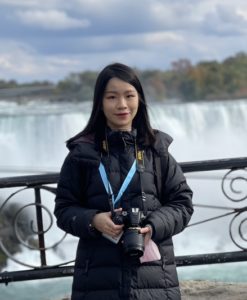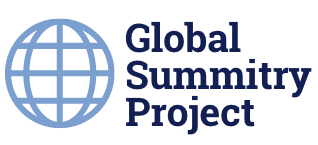
Oi Ching (Cyan) Ko
Cyan Ko is currently studying contemporary journalism at Centennial College. As a postgraduate student, she also holds a four-year undergraduate degree in journalism and mass communication from Hong Kong Shue Yan University. Having a previous journalistic-related academic background, Cyan has edited multiple videos during her academic life and has done news stories in both Chinese and English. English is Cyan’s second language, and she is fluent in Cantonese and Mandarin.
With a white curtain as the background for a Zoom meeting, she wore a pair of glasses and earphones showing in front of the screen. With a clear voice but a slow pace, she spoke English fluently but answered the questions cautiously.
The subject of this interview was press freedom in China and the woman, a former journalist, was guarded in her statements but clear in her belief that it doesn’t truly exist.
In the mid-2000s, she reported for the China Daily, an English-language news outlet, owned by the publicity department of the Chinese Communist Party. There were a lot of constraints when selecting certain topics to cover, she said. Any story that might be deemed sensitive by the government was avoided. Security visited her regularly to “monitor” her work.
As a Chinese journalist, she had never thought of fleeing her motherland until her ability for uncovering the truth was appreciated by someone she had never met. This someone suggested she work for the New York Times after the Times accepted one of her story ideas that had been routinely rejected by Chinese media outlets.
The journalist, a former research associate with a well-known east-coast law school, is now freelancing. She explained that she is still being scrutinized by Chinese authorities, and thus was not willing to disclose her personal information. We granted her request for anonymity and will call her Mary.
“The Chinese government does not allow Chinese nationals to have bylines in foreign newspapers,” Mary said. “People have to scroll down at the very end of the story, and it says merely ‘contributed to the report.’”
In newsrooms throughout North America, journalists gather daily to pitch stories and workshop ideas, preparing their work to meet a relentless series of deadlines and the expectations of their audiences.
It was a different situation in China where, Mary said, editors operate more as censors.
“There is a tricky situation … it’s being censored for a reason that nobody knew before,” she said.
She attended morning news meetings to pitch her story ideas to editors who censored the content of the pitches.
“The difficulty is that it is very hard to predict what kind of issue will become sensitive,” she said. “They (the editors) will say that all these issues are an insult them (the government).”
An example was the story of house demolition in China, she said. “If there’s something like forced demolition, you can write that someone’s house is forcefully being demolished. But you also have to write that the local government is doing its best to help the ones affected by this and offer compensation.”
An invitation to report for the New York Times made a difference.
“I just really want to live somewhere else for a change,” she said, and she left the country for the U.S.
The Chinese government’s critics are tolerated if citizens point out a specific social problem and ask for assistance instead of blaming “the government did this wrong, and they don’t want to fix it,” she added.
“The Chinese government ‘does not allow criticism’ is not true. The Chinese government ‘does not allow organizing (events to criticize the administration of the government).’”
Even if she could write about injustices in China, which have been addressed in a perfunctory attitude by the police state, the mission of journalists to reveal the truth still could not be embodied, she said.
China has a state-organized department to censor stories before their publication by news outlets, she said. If journalists work for a major paper, the department may call their editor and express their discontent with the story.
She said the ultimate goal of the government is to maintain its reputation through the monopoly it has on solving everyone’s problems, which it uses to conquer its citizens. Otherwise, “you are going to jail.”
As a journalist skilled at undercovering social problems in government, she had to frame her stories in a way to avoid being chastised by the government. But it was still an ordeal to report on China in terms of building intimacy and a close relationship with one’s source, Mary said.
The journalist described her sources as “naive” and told them, before interviewing them, about the possible risks of going on the record. Mary also prepared a “Plan B” to interview an expert and ask them to give general comments instead.
Her strategy was to interview experts on whatever subjects she was writing about, to have institutional protection from a legitimate academic source, to avoid any “foreseeable consequences.”
She recalls the case of a Tibetan school teacher who wanted to unveil an educational problem in China and insisted on going on record, even though the source was warned he would be taken into custody. He was then imprisoned for three years.
The Tibetan schoolteacher’s experience was a factor in her decision to leave China. She said the level of trust between journalists and sources seemed hard to maintain under the strict journalistic rules necessary for anonymity, and the possible harm to the source.
Many times, she felt powerless, having these “lofty” principles.
“In journalism, there’s nothing more sacred than someone pressing you to tell their story, but I don’t have the power to fully protect them (sources).”
Mary made the move to U.S. and to the New York Times in the 2010s, attended graduate school and has been working in the U.S. ever since.
Looking back, Mary said there was no independent journalism in the legacy Chinese media organizations, which only allowed publication with the information gatekeepers’ approval.
Every country has its own attempt to hide information, said Jeffrey Dvorkin, a senior fellow at Massey College in Toronto and a former director of the University of Toronto Scarborough journalism school. For instance, stories can be suppressed through censorship by classifying government documents, he said in an interview over Zoom.
Although he has not visited China, Dvorkin has taught journalism to many Chinese students. Some have told him, he said, that a journalist is ultimately responsible to the government and would never report stories critical of the government for personal safety reasons, which is vastly different than the experience of journalists in democracies like Canada.
The Chinese students have been told that they must never discuss the 3 “T” s — Taiwan, Tibet, and Tiananmen — and have to report any Chinese student who discusses these issues to the consul general, he said. “That is a serious dilemma.”
As long as China is run predominantly by the Communist Party, “there was never going to be a multiplicity of ideas and opinions and independent journalism in China,” Dvorkin said.
According to Mary, China is good at public diplomacy by using the media to distribute information favourable to the regime. There are official media outlets such as Global Times and People’s Daily that control the dissemination of information.
She said that there is a term for “keyword censorship” in digital media, where everything that goes online can be deleted if the authorities are unhappy with it.
“New media” and “self-media” are emerging across China, with writers attempting to build audience on platforms such as WeChat, despite the stringent censorship of media literacy.
Yet, the Chinese government has managed to find a way to control the Internet by building a closed network akin to an intranet, Mary said.
The “red line,” referring to the stringent restrictions on reporting any social or political related topics that are deemed sensitive and detrimental to the international image of the Chinese government or may even incite subversion of state power to Chinese citizens, is expanding, which is why the state’s censorship apparatus is so successful, Mary, the journalist from China, pointed out.
“The spaces are restricted a little by little, like a frog in a pot of hot water,” she said.
Interview with an exiled Chinese journalist
